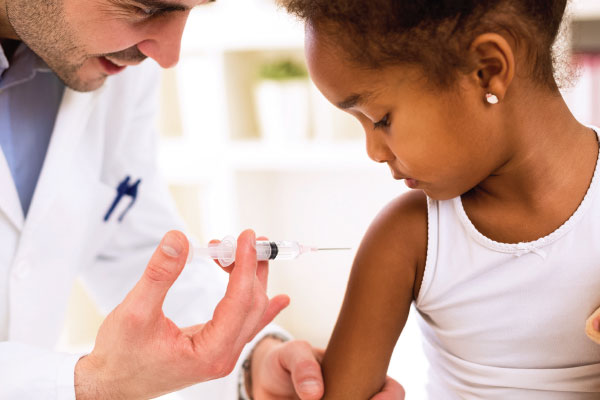Dr Jinan Harith Darwish is a paediatric allergy specialist and clinical immunology fellow at the King Faisal Specialist Hospital and Research Center. Each month she answers your health questions.
I will be travelling with my family this summer to Kenya. The recommendation is to have vaccinations for yellow fever as well as hepatitis A, typhoid, tetanus/polio/diphtheria but my baby daughter is only six months old and I also have a two year old and I’m very worried about giving them all these shots. In your view, are they really necessary? Also, there is no mention of malaria. How do I keep my family safe?
Vaccinating children for travel necessitates vigilant evaluation. Whenever possible, children must complete the routine immunisations of childhood on a normal schedule. However, travel at an earlier age may require accelerated schedules. Not all travel-related vaccines are effective in infants, and some are particularly contraindicated.
Yellow fever, a disease transmitted by mosquitoes, is endemic in certain areas of Africa and South America. Proof of yellow fever vaccination is a requisite for entry into some countries.
Infants and children aged nine months or older can be vaccinated if they travel to countries within the yellow fever-endemic zone. Infants aged less than nine months are at higher risk for developing encephalitis from yellow fever vaccine, which is a live virus vaccine.
Visitors with infants aged less than nine months should be advised against travelling to areas within the yellow fever-endemic zone. ACIP [the US Advisory Committee on Immunisation Practices] recommends that yellow fever vaccine never be given to infants aged less than six months. Infants aged six to eight months should be vaccinated only if they must travel to areas of ongoing epidemic yellow fever and if a high level of protection against mosquito bites is not possible.
More specifically, Kenyan authorities require it if travelling from a country with risk of yellow fever virus transmission and if aged one year or above.
It is generally not recommended for travellers whose itinerary is limited to the following areas: the entire North Eastern Province; the states of Kilifi, Kwale, Lamu, Malindi, and Tanariver in the Coast Province; and the cities of Mombasa and Nairobi.
Malaria is present in all areas, including game parks at altitudes below 2,500m and the city of Nairobi. There is resistance to the drug chloroquine. The recommendation is to use chemoprophylaxis for example atovaquone-proguanil or doxycyclineor mefloquine.
Kindly note, Zika virus is a risk in Kenya. Because Zika infection in a pregnant woman can cause serious birth defects, women who are pregnant should not travel to Kenya.
I recently cracked several ribs and am wondering if there is anything I can do to help them heal more quickly?
I’m mostly OK but first thing in the morning my chest is very painful and it is sometimes hard to take a full breath. I’ve been like this for five weeks now and am getting very fed up.
Oh dear, oh dear. I’m so sorry to hear that. Pain like you experienced is the most common symptom that people experience with rib fractures. It will often take upwards of six weeks, sometimes six months, for the fractures to heal and for individuals to become entirely pain free. This pain results mostly from the movement of the broken ends and, subsequently, with each motion or deep breath, the unstable ends move and pain ensues.
Pain control is a top priority in the care of rib fractures. Poor pain control renders the patients unable to effectively breathe deeply, placing them at risk for collapse of the air sacs in their lungs — medically termed atelectasis — and at a higher risk for pneumonia.
Certified nutritional consultant Phyllis A Balch states in her book, Prescription for Nutritional Healing, that eating half a fresh pineapple daily until your fracture heals may be particularly helpful. You ought to consider avoiding soft drinks. Bone density in women may be reduced by soft drink consumption. The phosphoric acid in a beverage binds to calcium in the gut which keeps the calcium from being absorbed. Other beneficial foods for the purpose of bone healing include foods rich in calcium, such as milk, yogurt, cheese, black beans and spinach.





































